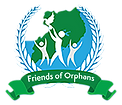War Affected Children
Friends of Orphans believes that war affected children have wounds in their hearts and minds which need to be washed clean and treated through rehabilitation, education, health, livelihood, child rights protection and empowerment. Friends of Orphans knows that war affected children can work themselves out of poverty with respect and dignity if they are not treated as objects, but rather, as subjects. Therefore, we use multiple strategies to combat unemployment by addressing the challenges and realities of life faced by these children since we know that children born in these situations are not of their own making.
Orphans, vulnerable children and war affected children do not have to stay victims forever. They can take control of their future and stop the cycle of poverty and hopelessness. We provide these children with access to vocational skill training, primary and secondary education, and promotes their ability to earn income via innovative, sustainable and non-exploitative means. Our program facilitates the long-term social reintegration of these children and enables them to contribute to the development of their communities.
Thousands of war-affected children and young people in northern Uganda have experienced violence, abuse, neglect and stigma on a regular basis. For 23 years during the war a whole generation of northern Ugandan children grew up, knowing only war and violence, and nothing else in life, no other life than the disease-ridden, bare, crowded displaced person’s camps. Though the insurgency is over, many still remained traumatized in their homes, while many others roam the streets of Northern Uganda with their trauma. These categories are now producing children who are living in extreme poverty.
The war, displacement and poverty have also eroded traditional social support networks, such as the extended family, surrounding many children. Therefore, the sources of support children could once have turned to for help are no longer functional. They have difficulties in protecting themselves from harm or accessing their rights to education and financial support.
A big number of men lost their lives during the 23 years’ war in Uganda leaving behind widows, dependents and orphans. Most of the widows are illiterate and can’t generate enough income to look after the children left behind by their husbands. Many young girls below 15 years were abducted by the rebels and used as sex slaves. This resulted into many producing children when they are not yet able to look after. Many became HIV/AIDS victims. Most of them were denied chances to go to school, leaving them with no skills to generate income for themselves and their families. They grew up illiterate knowing only war and violence.
A sane society could not sit back and watch. It is against this background that Friends of Orphans took the initiatives to provide these children with education to promote and protect their rights.
Friends of Orphans is helping to build lost hope and confidence in children whose early lives were stolen away. They have lost families, homes, lives and a sense of belonging. Many have perished and have been deprived of their families, education and health facilities. These children grew up illiterate in violent situations and with ignorance, knowing only how to operate gun
They have no employable skills, but Friends of Orphans, helps them get back on their feet and on the road to self sufficiency and success.
We provide sustainable access to vocational skill training, primary and secondary education for acutely marginalized war-affected children and young people in Northern Uganda. while also promoting their ability to earn income via innovative, sustainable and non-exploitative means.
A wealth of research has highlighted the cumulative benefits of education in conflict-affected countries; there are clear links between education and children’s improved ability to protect themselves from harm, as education develops the life skills, self-esteem and cognitive abilities children require to increase their resilience to potential abuse and poverty itself. Indeed, it has been noted that children and young people in Agago and Pader districts who had low educational levels were more vulnerable to abuse and felt the most excluded from their communities.
We believe all children and women can embrace who they are,
can define their future, and can change the world.
